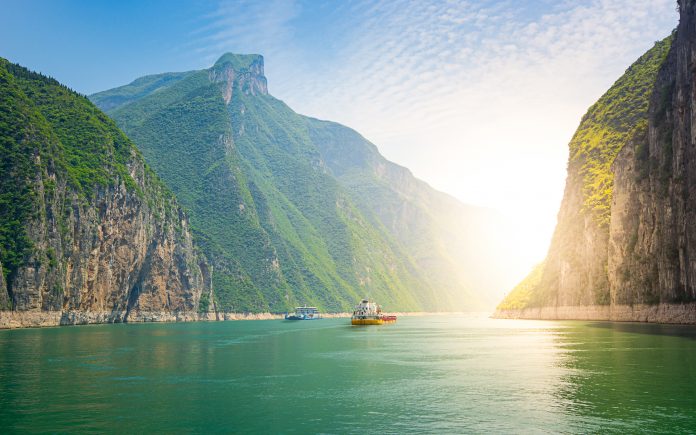
We embarked on a three-day cruise down the Yangtze River on the LiAnn, part of the Victoria Cruise Line. This sailing, which left from Chongqing, was part of our larger tour of China.
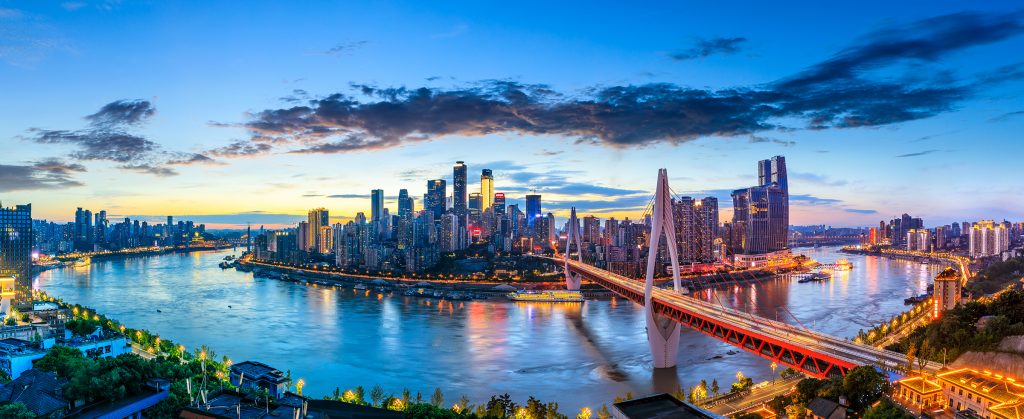
Chongqing is an amazing city. With a population of approximately 33 million people, this foggy, mountainous municipality served as the headquarters of Chiang Kai-Shek. We visited the house of General Joseph Stilwell, the commander of the US WWII mission in China. He was sent to help Chiang Kai-Shek against the Japanese advance. The museum, which is housed in General Stilwell’s former home, is educational and well done. In addition, the view from the house of the city and river below is breathtaking.
 We were able to visit a beautiful park adjacent to the Three Gorge Museum as well as an upscale shopping and business area, Jiefangbei Square, that dwarfs most shopping areas. The pedestrian area is lined with huge shopping malls, many of which are lit with jumbo-tron screens.
We were able to visit a beautiful park adjacent to the Three Gorge Museum as well as an upscale shopping and business area, Jiefangbei Square, that dwarfs most shopping areas. The pedestrian area is lined with huge shopping malls, many of which are lit with jumbo-tron screens.
Our first stop of the cruise was in Feng Du which has been known as the Ghost City since the Han Dynasty. (The name has nothing to do with the fact that the old city of Feng Du is now submerged by the Three Gorges Dam reservoir.) Supposedly, two officials from the Han Dynasty settled just outside the original city. When their names were combined, it sounded like “King of Hell.” Some stories also tell that the two became immortal. “The Ghost King,” the largest rock sculpture in the world, can be seen from all over the city.
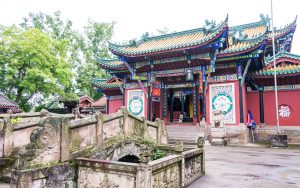 In Feng Du the cultures of Confucianism, Taoism, and Buddhism are combined with the mystique of ghosts. In the Chinese version of the afterlife, the dead must undergo three major tests to enter the netherworld which bears a marked resemblance to that in Greek mythology. These tests are taken at three locations—Nothing-To-Be-Done Bridge, Ghost-Torturing Pass, and the Tianzi (Son of Heave) Palace, all of which are sites within the complex located on Ming Mountain. (We passed one of the tests—or at least a modified version of it.) Inside the temple is also a huge diorama demonstrating the various punishments for sins in a very gruesome and realistic manner. (For example, how does burning in hot oil sound as punishment for sin?)
In Feng Du the cultures of Confucianism, Taoism, and Buddhism are combined with the mystique of ghosts. In the Chinese version of the afterlife, the dead must undergo three major tests to enter the netherworld which bears a marked resemblance to that in Greek mythology. These tests are taken at three locations—Nothing-To-Be-Done Bridge, Ghost-Torturing Pass, and the Tianzi (Son of Heave) Palace, all of which are sites within the complex located on Ming Mountain. (We passed one of the tests—or at least a modified version of it.) Inside the temple is also a huge diorama demonstrating the various punishments for sins in a very gruesome and realistic manner. (For example, how does burning in hot oil sound as punishment for sin?)
After re-boarding the boat, we sailed for our next stop, Shibaozhai, to visit the Shibaozhai Pagoda. The road on the way up to the suspension bridge, that visitors must cross to reach the pagoda, has enough shopping opportunities for even the most hardened shopping fanatics. The pagoda is built into the side of a cliff on an island. The island is surrounded by a dam that protects the structure from flooding caused by the Three Gorges Dam. The 656-foot-tall pagoda was built entirely without nails. The picturesque red pagoda is a popular photo op for tourists.
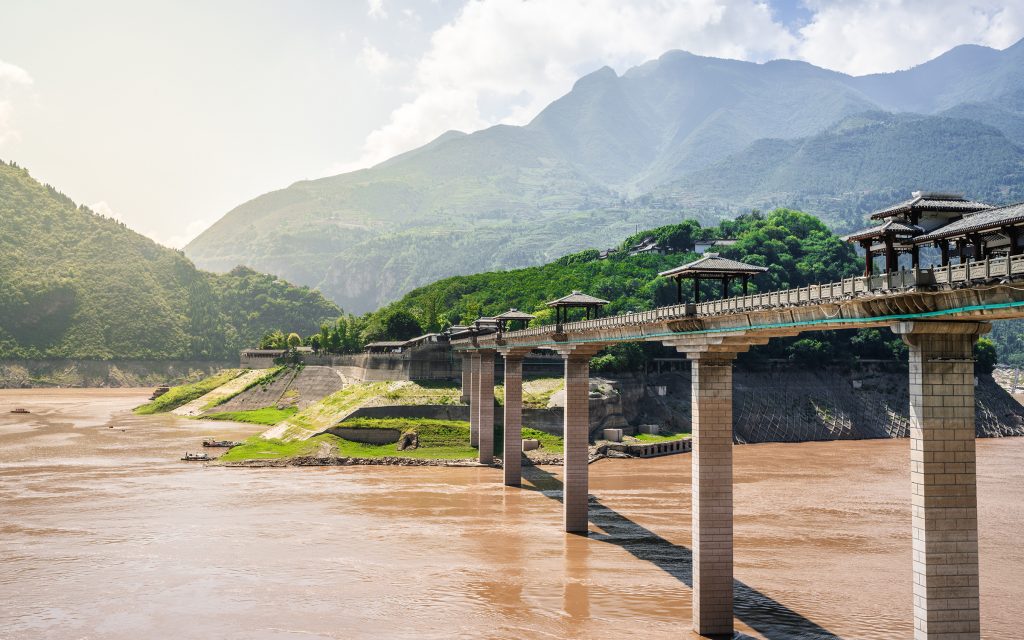
Another day, another stop, this time in Fengjie, home of the White Emperor City, Baidi Temple. The temple overlooks the Qutang Gorge, the first and smallest of the three Yangtze gorges. Like many other ancient cities in the area, Fengjie was submerged by the Three Gorges Dam Project, but new areas are growing up.
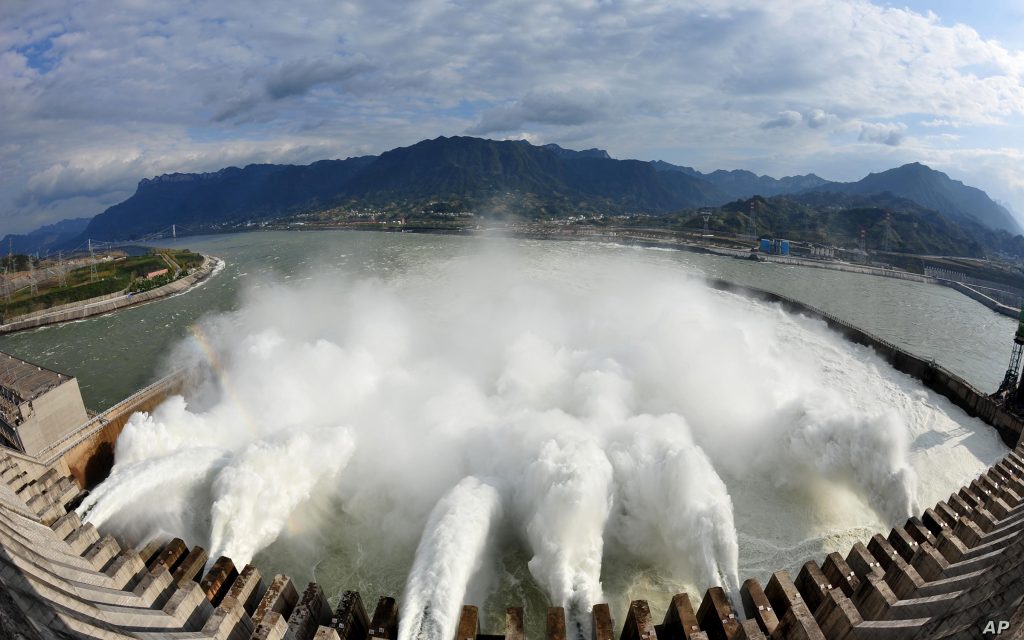
After the Qutang Gorge, we entered the 25-mile-long Wuxia (Witches) Gorge. This gorge is famous for its fabled Twelve Peaks. According to legend, the peaks are believed to be the spirits of 12 fairies. The Xiling Gorge is the longest and deepest of the three gorges and was the final one we passed through before the dam. We were fortunate that the day was relatively clear and we could see the dam. Our guide told us multiple times that usually the dam is invisible because of the dense fog.
The Three Gorges Dam Project is the largest hydro turbine project in the world. The facility is fascinating and huge, like everything in China. The tour of the dam project made a fascinating way to end our Yangtze River cruise as we then headed for Shanghai.
– Candace Ahlfinger has loved traveling since she was little and has always been on the go whenever possible. Now she is retired and gets to do what she loves best… TRAVEL! Whether it’s traveling with her wonderful husband, or our children and grandchildren, traveling is a great experience that enriches her life. Because she always enjoys reading and hearing about others’ travel experiences, she wants to share her travels with the Ellis DownHome readers.






